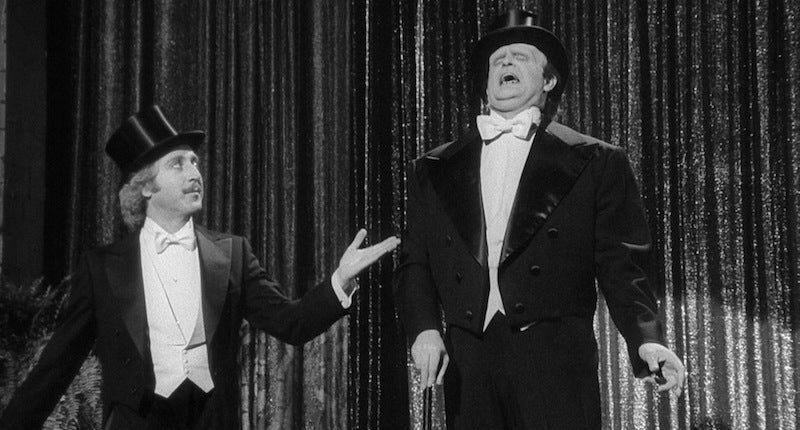
For centuries, humans have placed way too much importance on people playing fictional characters on stage. And when you’ve done that for as long as we have, things are bound to get weird occasionally. Here are five of the strangest stories from the history of theater.
1. The secret to an illusionist’s trick was discovered when he died in a theater fire.
The highest paid magician of the early 20th century was Sigmund Neuberger, also known as the Great Lafayette. In May of 1911, a freak accident caused his stage to catch fire in the middle of his signature illusion, “The Lion’s Bride.” The audience, of course, thought that the fire was part of the act.
While the stage manager actually got the audience to leave by playing “God Save the Queen,” many staff members died when the ironically named safety curtain jammed, leaving a gap through which a gust of air fed the flames. Add to all that the fact that the Great Lafayette had had the doors locked so that the lion couldn’t escape and you have a recipe for disaster.
The Great Lafayette escaped but returned to the theater to rescue his horse. He and ten other actors died in the fire. What was thought to be his body was found and cremated, but two days later a body in identical clothing was found. It was the real Lafayette and the first corpse found was actually the body double he used to execute his illusions.
2. The Greeks had a “three-actor” rule.
This didn’t include the chorus, the members of which apparently weren’t considered “actors.” But in the case of the actual play, the convention was to have only three actors. In the case of tragedies (bonus fact: “tragedy” translates to “goat song”), Aristotle gave Sophocles credit for this invention, writing in Poetics that he “raised the number of actors to three, and added scene-painting.”
As for comedy, Tzetzes, writing in the 12th century, said that Kratinos brought order to comedy performances by “fixing the number of characters at three.” For a moment, just imagine trying to reduce the cast of your favorite TV show to three people.

3. The whole “Scottish play” curse was made up by a critic who was bored of Shakespeare.
Have you ever heard about the first production of Macbeth, so cursed that the boy playing Lady Macbeth died and Shakespeare himself had to take over the role? Yeah, that’s a total lie.
Writer Max Beerbohm invented that story in 1898, apparently as a way to deal with the crushing boredom of reviewing Macbeth every time it was mounted. He went to a fair amount of work, too, inventing fake quotes from a 17th century diarist named John Aubrey about how the young actor Hal Berridge “ ‘b’fell sudden sicke of a pleurisie, wherefor Master Shakespeare himself did enacte in his stead.”
If you—like I—ever had to leave a theater, spin around three times, spit, and curse because you accidentally said the name of the play, you now know who to blame.
4. The Egyptians performed the same play for almost 2,000 years.
One of the very earliest examples of theater in human history was, of course, also a ritual. First performed around 2500 BCE, the “Abydos Passion Play” told the story of the death, burial, and resurrection of the god Osiris. The play was performed every year for approximately 2,000 years.
There are also accounts of a religious drama for the festival of Horus. The temple at Edfu has hieroglyphics that could be instructions for actors in a giant play depicting the battle between Horus and Seth. And accounts have it that a live hippopotamus played the role of Seth and was slaughtered.

5. The Romans actually killed real people on stage
If it’s realism on the stage you want, you cannot beat the Romans. Outside of their gladiatorial bloodlust, the Romans also had a habit of substituting criminals into plays for punishment. So if a character died in the fictional story, a real criminal condemned to death would really die on stage.
Tertullian—who, to be fair, was writing as a Christian condemning the paganism of Rome, so consider the source—wrote that he saw a person burned to death as Hercules and another castrated as Attis. The Romans had a penchant for turning their executions into mythological plays, which means that anyone today who claims to be doing “method” acting has nothing on them.
Contact the author at katharine@io9.com.